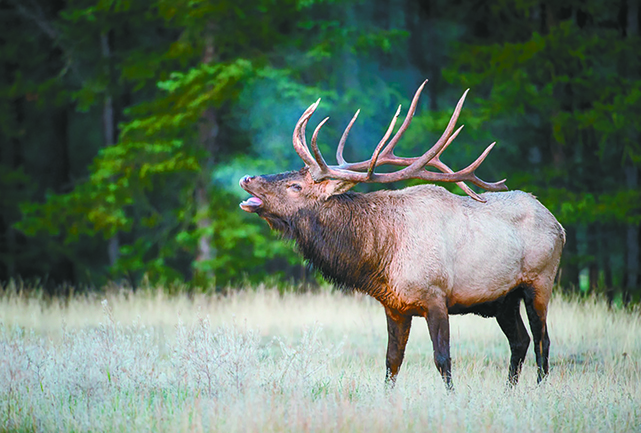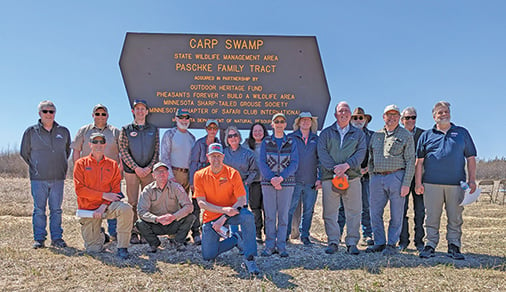Michigan Mixed Bag: DNR urges UP motorists to watch out for deer on the run – Outdoor News

Marquette, Mich. — Michigan DNR Wildlife Division officials are urging motorists in the Upper Peninsula to be mindful of increased deer movement.
Deer are moving from deer wintering complexes in many areas back to range they occupy during the spring and summer. As a result, deer movement has increased in recent days.
Motorists are urged to remain alert, anticipate deer crossing roads, and use extra caution behind the wheel.
Becoming an Outdoors-Woman Program Offers Turkey Hunt in Tuscola County
Cass City, Mich. — The Michigan DNR Becoming an Outdoors-Woman Program is offering a Beyond BOW Turkey hunt workshop for women.
Scheduled for the weekend of May 10-11, the program is for women with no previous experience or who would like to expand on or learn new skills and abilities. Space is limited to seven participants.
The free Beyond BOW event will be held in Cass City and is sponsored by the National Wild Turkey Federation, Cabela’s, and Ben’s Great Outdoors. Ammo, shotguns and lunch will all be provided; however, overnight lodging will be the responsibility of the participants.
The workshop is open to any properly licensed woman hunter, 10 years of age or older. No experience is required; proper safety and hunting techniques will be taught and followed. Deadline for registration/cancellation is May 1.
MORE COVERAGE FROM MICHIGAN OUTDOOR NEWS:
Michigan’s hunting, fishing license sales increased in 2023
Michigan DNR receives $39.8M in federal funding in 2024
Class information and registration materials are available online at Michigan.gov/BOW. This will be a rain or shine event.
For further information, contact Michelle Douglas at (906) 235-2076, Ron Sting at (989) 872-5300 or email [email protected].
Keep Bears at a Distance – Remove Bird Feeders Now!
Lansing — Spring brings blooms, bugs and black bears.
This time of year, bears are leaving their dens and will be searching for food sources to replenish their bodies after eating very little since last fall.
To prevent a bear encounter in your backyard, take bird feeders down, bring garbage cans inside and remove outdoor pet foods.
As bears leave dens, they will first pursue water and fresh vegetation to flush their systems. While those foods are abundant and accessible, the calorie-rich offerings of bird seed, garbage, beehives and pet foods are a mighty prize to a hungry black bear.
Allowing bears to eat from food sources near homes often can lead to problems for both the people who live there and the bears. Feeding from these types of food sources can turn bears into repeat visitors that may lose their fear of humans, cause damage to property or create dangerous situations for people, livestock and pets.
Bears are an essential species in Michigan’s ecosystems because of their critical roles as seed dispersers. As spring arrives and people spend more time outside, know that human behavior affects bear behavior. Don’t wait until you see a bear to act. Remove food sources now and keep Michigan’s black bears at a distance.
Timber Harvest Will Take Place Near DNR’s Customer Service Center in Cadillac
Cadillac, Mich. — Timber harvest activities have begun around the Michigan DNR’s customer service center on Mackinaw Trail in Cadillac.
The DNR buildings are surrounded by about 26 acres of land that is part of Michigan’s state forest system. The harvest involves 15 acres and has been carefully planned to remove invasive trees such as Scotch pine and black locust as well as invasive shrubs like honeysuckle. These aggressive species can prevent native trees and shrubs from growing.
“We retained several pockets of native tree species including mature oaks and pines,” said Mike Aksamit, DNR land use specialist who planned the timber harvest. “The removal of invasive species from the 15 acres in the harvest area will be a net positive for the local landscape.”
Timber harvests are among many ways the DNR manages Michigan’s nearly 4 million acres of state forest land. Michigan’s state forests are certified as sustainably managed by two independent agencies. Harvests are part of that management.
A local forest products company is expected to conclude all activities on the site by mid-April.
Invasive Hemlock Woolly Adelgid Found in Western Antrim County
Lansing — The Michigan Department of Agriculture and Rural Development recently verified a new detection of invasive hemlock woolly adelgid near Torch Lake in western Antrim County. The extent of the infestation has not yet been determined, but an extensive survey of the surrounding area is underway. With this new detection, Antrim becomes the seventh county in the state with an active hemlock woolly adelgid infestation, joining Allegan, Benzie, Mason, Muskegon, Oceana, Ottawa, and Washtenaw counties.
Suspected infestations in Antrim County or new areas of the state can be reported by emailing MDARD at [email protected] or calling the Customer Service Center at (800) 292-3939.
For more information on hemlock woolly adelgid and other invasive species in Michigan, and to find out what you can do to help prevent them, visit Michigan.gov/Invasives.







